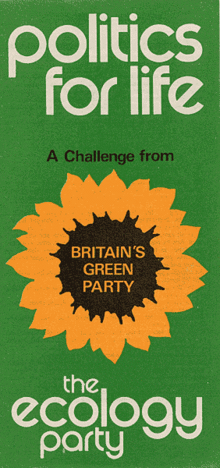Ecology Party
The Ecology Party | |
|---|---|
 | |
| Leader | Tony Whittaker |
| National Secretary | Lesley Whittaker |
| Chairman | Jonathan Tyler |
| Founded | 1975 |
| Dissolved | 1985 |
| Preceded by | PEOPLE Party |
| Succeeded by | The Green Party |
| Headquarters | Coventry |
| Ideology | Green politics |
| Political position | Left-wing |
| Part of a series on |
| Green politics |
|---|
.svg.png) |
|
Core topics |
|
Four Pillars |
|
The Ecology Party was a political party in the United Kingdom. It succeeded the People Party after a name change in 1975. The Ecology Party was the second step for Green politics in Britain and the grassroots of the Green Party of England and Wales.
A councillor and changes
The party won its first representation in 1976, when John Luck took a seat on Rother District Council in East Sussex, and party campaign secretary John Davenport won a parish council seat in Kempsey.[1]
Jonathan Tyler was elected as the first chairman of the party in 1976,[1] and Jonathon Porritt became a prominent member. That same year the Leader Tony Whittaker and National Secretary Lesley Whittaker (founder members of the original PEOPLE party) greatly reduced their involvement with the party.[2] At the 1977 Party Conference in Birmingham, the Party's first constitution was ratified and Jonathon Porritt was elected to the Ecology Party National Executive Committee (NEC). Porritt would become the Party's most significant public figure, working, with David Fleming, "to provide the Party with an attractive image and effective organization".
1979 electoral success
With Porritt gaining increasing prominence and an election manifesto called The Real Alternative, the Ecology Party fielded 53 candidates in the 1979 General Election, entitling them to radio and television election broadcasts. Though many considered this a gamble, the plan, encouraged by Porritt, worked, as the Party received 39,918 votes (an average of 1.5%) and membership jumped tenfold from around 500 to 5,000 or more. This, Derek Wall notes, meant that the Ecology Party "became the fourth Party in UK politics, ahead of the National Front and Socialist Unity".[3]
Moving forward
Following this electoral success, the party introduced annual spring conferences to accompany autumn conferences, and a process of building up a large compendium of policies began, culminated in today’s Policies for a Sustainable Society (which encompasses around 124 520 words[4]). At the same time, according to Wall, "the Post-1968 generation" began to join the Party, advocating non-violent direct action as an important element of the Ecology Party vision outside of electoral politics. This manifested itself in an apparent "decentralist faction" who gained ground within the Party, leading to Party Conference stripping the Executive of powers and rejecting the election of a single leader. The new generation was in evidence in the first 'Summer Green Gathering' in July 1980, the action of Ecology Party CND (later Green CND), and the Greenham Common camp. The Party also became increasingly feminist.[3]
1983 general election

Due to the recession causing the marginalisation of Green issues, Roy Jenkins leaving the Labour Party to form the Social Democratic Party (SDP), and the inability of the Party to absorb the rapid increase in membership, the early 1980s were extremely tough for the Ecology Party. Nonetheless, the Party prepared for the 1983 General Election, spurred on by the success of Die Grünen in Germany. In the 1983 General Election, the Ecology Party stood over 100 candidates and gained 54,299 votes.
References
- 1 2 "ECOLOGY - The New Political Force", The Ecologist, November 1976, p.311
- ↑ Another Green World.blogspot.co.uk/2006/10/green-party-hist-ch1-pt-2.html
- 1 2 Wall, Derek, Weaving a Bower Against Endless Night: An Illustrated History of the Green Party, 1994
- ↑ "(youth section of the Green Party of England and Wales) Policy Website". Young Greens. Retrieved 2010-11-28.
